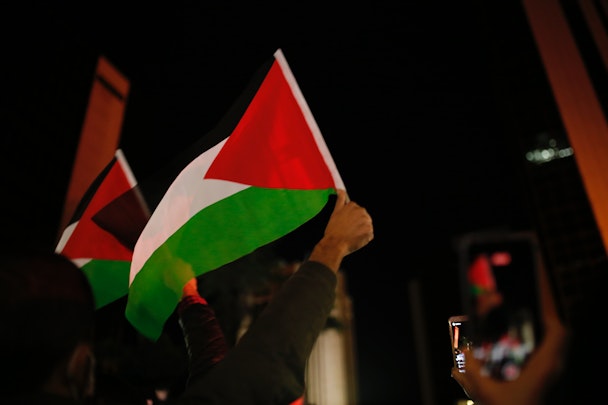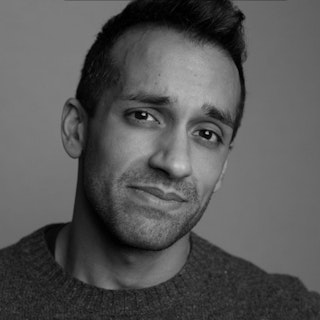Adland’s moral voice is usually deafening. On Gaza, it’s deadly silent
As the World Court hears a historic genocide case against the Israeli government, the usually vocal leaders in the ad industry haven’t added to the chorus calling for a ceasefire in Gaza. Ashish Prashar, political strategist, human rights activist and former CMO of R/GA, asks why.

/ Ömer Yıldız
Agency leaders are typically quick to issue statements in response to current events (from the murder of George Floyd to the January 6 insurrection to the war in Ukraine) and call out issues at the heart of the ideals of freedom and human rights.
But despite growing global condemnation of the ongoing human rights violations and alleged war crimes committed in Gaza, agency leaders have chosen to remain silent for months after many of the same leaders were quick to issue statements in the wake of Hamas’ October 7 attack.
If they felt compelled to condemn the deaths of civilians in that attack, why have they been silent about the continued indiscriminate killing of Palestinian civilians in Gaza by the IDF?
On the ground in Gaza
“For every hour that goes by in Gaza, two mothers are killed,” according to South Africa’s grim submission to the International Court of Justice (ICJ). The report characterizes measures resulting in such deaths by the Israeli government as “intended to prevent Palestinian births.”
Advertisement
It was among the evidence included in support of an official accusation that the government of Israel is engaging in an ongoing genocide of the Palestinian people. South Africa, of course, is a country that suffered atrocities at the hands of white colonizers during a long period of apartheid – and likely sees parallels.
South Africa’s application lays bare Israel’s brutal actions on the ground, and it places the current unprecedented aggression in the proper historical context, 75 years of ethnic cleansing and denial of Palestinian rights and 56 years of Israel’s illegal colonial occupation. It is a compelling indictment of Israel’s actions, and it will have to prove there was an intent to commit genocide. The case will take years, but it can secure short-term concessions.
Advertisement
Meanwhile, in occupied Gaza, the violence has entered its fourth month. An entire population is starving. An entire territory has been decimated.
More than 22,000 thousand have been killed, and thousands more maimed. A human rights organization puts the figure at 30,000. 85% of the population has been forcibly displaced. Meanwhile, an average of over ten children lose one or both of their legs, according to international nonprofit Save The Children.
With the ICJ filing formalizing the international condemnation of Israel’s human rights abuses against Palestinian civilians, it’s notable that the ad industry remains silent despite evidence stacking up.
Here are some recent quotes from leaders in Israel about their intent in Gaza. South Africa has included them in its case.
Suggested newsletters for you
President Herzog said: “It’s an entire nation out there that is responsible. It’s not true this rhetoric about civilians not being aware, not involved. It’s absolutely not true... and we will fight until we break their backbone.”
Minister of defense Yoav Gallant said Israel is “imposing a complete siege on Gaza. No electricity, no food, no water, no fuel. Everything is closed. We are fighting human animals, and we are acting accordingly.
“Gaza won’t return to what it was before. We will eliminate everything. If it doesn’t take one day, it will take a week. It will take weeks or even months, we will reach all places.”
Back in Gaza, the ongoing hunger crisis worsens. In a paper released this week, the human rights organization B’tselem reports that most cultivated fields in Gaza have been destroyed. Meanwhile, accessing any remaining open areas during the war is dangerous, factories and warehouses have been bombed and shut down, and private stockpiles have long since run out.
The escalating hunger crisis in the region is not an incidental effect of the war that can’t be prevented. It is the result of decisions made by the Israeli occupation, which lets in a fraction of goods that entered before the war, placing burdensome restrictions on what types of goods are allowed in. They also control how they are distributed. A continuation of the IDF’s policy will inevitably result in widespread famine and death. Such a policy of refusing to follow international law should constitute a war crime.
What happens if the ad industry ignored apartheid and genocide?
Many people in leadership positions will often say something to the effect of “they would have protested or boycotted” or helped sway clients into withdrawing from Apartheid South Africa. It’s easy to hold such convictions in retrospect once progress has already been made, with no sacrifice or risk involved.
I believe Israel was engaging in apartheid long before its recent atrocities. The UN Economic and Social Commission for West Asia found the government of Israel guilty of apartheid back in 2017.
We’re now in a moment of truth, with such leaders – and the industry more broadly – being put to the test to truly stand behind such convictions. Condemning ongoing mass civilian casualties in Gaza and calling for a ceasefire should be a clear ethical prerogative for leaders who care about human rights and sovereignty. Supporting an immediate ceasefire should be the minimum for any leader who purports to stand against violent injustice and has used their platform to advocate for other issues. More committed and courageous messages might be to advocate for the rights of the Palestinian people.
As an industry that likes to think of itself as attuned to the cultural landscape, the lack of clarity of conscience is especially galling. Over time, an international consensus has grown around condemning the actions of Israel’s military and the desperate need for a ceasefire to end the conflict. Agencies like to talk about shaping culture rather than simply reacting to it. That agencies and their leaders haven’t acknowledged this with words or actions only shows them to be out of touch.
It’s a unique moment putting leaders to the test.
They can decide to stand with the Palestinian people against apartheid and genocide, speak out, and help guide decisions future generations will acknowledge as important steps forward. Or they can continue sitting quietly on the sidelines. To those watching, their silence is no different from those who refused to stand with Mandela and Tutu and speak out against apartheid in South Africa decades ago.
This is the moral test we currently face and with which future generations will judge today’s leaders.
Ashish Prashar is a political strategist, human rights activist and co-founder of Gaza Voices. He was the CMO at R/GA, he’s worked for the Conservative Party, Boris Johnson, Tony Blair, Barack Obama, and Joe Biden.
Editor’s note: Immediately after the October 7 terror attack on Israel, creative and comms strategist Cate Rubenstein shared her views with The Drum: Brands that champion minorities fall silent when Jews suffer.
Some agencies offered support to staff in Israel at the time, but industry comms regarding the conflict have been muted since. The Web Summit founder Paddy Cosgrove resigned after condemning what he called "war crimes" late in October 2023. Few business leaders have shared views on the divisive conflict even months later.

